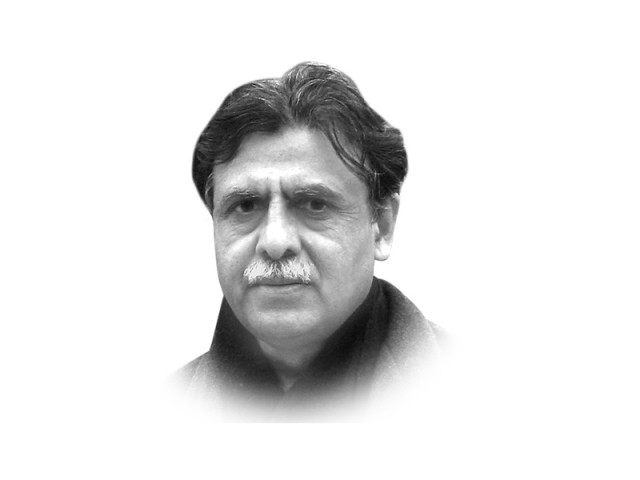Mind your language
Hardly a day goes by when we do not hear politicians hurling invectives at each other

The writer is an author, a public policy analyst and former interior secretary. He teaches at LUMS
Imran Khan is generally accused of having muddied the political discourse but one can find much worse examples dating back to the late 1980s when the PPP and the newly incubated alliance, the IJI crossed swords. The latter’s stalwarts went to the extent of circulating pamphlets in Lahore accusing the late Nusrat Bhutto of dancing on the floor with former US President Gerald Ford. These elements forgot that brave lady’s struggle against Martial law, braving police beatings, with her head oozing with blood outside the Gaddafi Stadium as she protested her husband’s incarceration. Zulfikar Ali Bhutto was also no exception when it came to name calling. I recall a rally at Liaquat Bagh, Rawalpindi where he called Khan Abdul Qayum Khan “Double Barrel Khan”. This was before Khan was chosen as a future political ally. Mr Bhutto also did not have any qualms referring to an adversary as a chooha (mouse), who was later conferred with a diplomatic assignment.
Imran Khan may have all the charisma in the world, being the crowd-puller that he is, but it is difficult to disagree with his detractors who feel that in recent times he has been instrumental in debasing the tone and tenor of the country’s political discourse. He has clearly fallen short when it comes to his choice of words. He needs to understand that politics is not merely about populism, it is equally constituency-driven, which calls for a deep ingress and organisational tedium. Things have come to such a pass that the MQM has moved a resolution against K-P Chief Minister Pervaiz Khattak, demanding that he be charged under Article 6 of the Constitution. The MQM feels that his recent utterances smacked of creating ethnic and regional hatred. At the same time the MQM conveniently forgot the language of its erstwhile leader Altaf Husain, with his addresses often featuring venom against Pakistan and the armed forces much before the party severed its links with him. The party also needs to explain as to why it continued to huddle with former president Pervez Musharraf (someone who was also charged under Article 6) for eight long years, even after Akbar Bugti’s unfortunate killing, an incident largely responsible for the ongoing imbroglio in Balochistan.
As if all this was not enough, Chairman Bilawal of the PPP in a recent public meeting in Ghotki took on Imran Khan by mentioning the former cricketer’s father, the late Ikramullah Khan, in a derogatory manner. This was in reaction to Imran Khan’s constant invective against Asif Ali Zardari. Here, Bilawal displayed poor judgment as he failed to differentiate between a public office holder who is still pulling the chords of a major political party through remote control and the late Ikramullah Niazi, who was a political nonentity. The young chairman needs to tread with caution while he is still burdened with the baggage of the recent past. This baggage has distinctly sapped the groundswell of the Bhuttos’ legacy which is certainly not inexhaustible.
One can’t but help recall the rallies of Mohtarma Fatima Jinnah. As a college student, I had the opportunity to attend quite a few of her rallies. The message would be terse and clear and the opposition would take on the government convincingly. The scandal of the Gandhara Industries involving President Ayub Khan was one of the key issues of the time. It was addressed forcefully while putting the state machinery on the back foot. The leadership of yore never used expletives. Instead, it resorted to the verses of Mir Taqi Mir, Momin, Ghalib, Nazir Akbar Abadi, Iqbal and Faiz to mount its attacks. In Pakistan’s politics, lingua of our politicians is the biggest casualty. It is devoid of erudition and fair research. It clearly does not have the sterling touch of the language employed by the old guard. There is great substance in the narrative that without accountability, transparency and scrupulous avoidance of conflict of interest, we cannot make any progress. We live in a world where the ideological divide of the left and right is now a story of the past. What is relevant today is delivery based on good governance practices. As a keen watcher and frequent visitor to Singapore, while one tends to agree that it is a clinical laboratory providing adaptable parameters for social re-engineering and national reconstruction, what cannot be ignored is its zero tolerance for corruption. Singapore’s system did not even spare the father of the nation, Lee Kuan Yew who had to face a high-powered probe on charges of conflict of interest. He had bought a plot from a developer in the open market and subsequently sold it when the market was doing well. He had to prove that this was a transparent transaction with legal money and no influence peddling or conflict of interest. It is about time our leadership sermonises less on ‘national interest’ and does more to shun conflicts of interest. The election commission also needs to play a more proactive role in regulating the conduct of political figures while they fall prey to the use of abusive language. The conduct rules in vogue in India make appropriate provision for this but our rules are silent in this regard. There should be heavy penalties for the derelicts, which should include temporary bars on their political activities.
Published in The Express Tribune, November 15th, 2016.
Like Opinion & Editorial on Facebook, follow @ETOpEd on Twitter to receive all updates on all our daily pieces.
















COMMENTS
Comments are moderated and generally will be posted if they are on-topic and not abusive.
For more information, please see our Comments FAQ